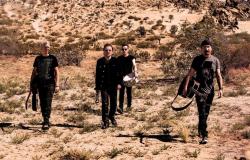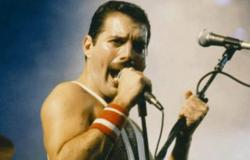
Dilson Díaz, vocalist of La Pestilencia, in an interview for Claro Oscuro, the video interview format of the Entertainment section of El Espectador.
Photo: Richard León
On April 12 they performed for the first time in the Plaza de Bolívar in Bogotá at the PazRock concert. What is the balance?
I would say that it was the most symbolic concert. The concert that we have liked the most in the 35 or more years of musical career that we have had. It was very nice. It was a special place to say what we wanted to say, in a thoughtful and very calm way. It was the concert of a lifetime in the history of The Plague.
A song that was special that night…
“Vote for me”. That song is a political reflection of Colombia. Of all the promises they have made and nothing ends up happening. They all come with the same speech and promise to solve things, and when we see there is misery, death, hunger. The whole issue of the social decomposition of the country is very strong.
So “Vote for me” symbolized all that. And at the concert in Plaza de Bolívar people connected a lot and understood very clearly what we wanted to say. And the thing is that we citizens build the country, not whoever they put in power or whoever puts them in power.
What reading do you make of the political moment in Colombia?
The reading is that ultimately young people were the ones who chose what is currently administering the country. We have also asked a lot for that, that if what has been chosen does not work, the young people themselves are in charge of rejecting it. To manifest.
This generation has its pants tied tighter and if they see the need, they have the power to say: let’s go with this or let’s not continue with the same thing. See what happens.
Now there is a new process, we have to see what happens, if it doesn’t work, let us and all the young people be the ones to react and not let things continue to be manipulated in the way in which they have historically been manipulated.
Watch the interview with Dilson Díaz for Claro Oscuro from El Espectador:
It was 25 years since the concert in which La Pestilencia opened for Metallica in Simón Bolívar Park. What memory do you have of that concert?
The memories are all very beautiful. For example, seeing two days before how people set up their tents in Simón Bolívar Park while waiting in line.
The setting was impressive. Metallica brought some additional things that they installed on the stage and when I saw the corridors to the sides and I couldn’t believe it. I thought I was going to be limited to one space, but they authorized me to run around the entire stage. He management from Metallica told me: do it and the console is all yours, whatever volume you want.
I remember that the concert was organized by two partners. One of them tells me: Metallica hasn’t arrived, they’re just landing. Entertain them. He has more time to play.
We had like a set of eight or ten songs to play, but, well, we said, let’s give it a go. Let’s keep going. So it was very nice to continue playing more time on stage.
I remember Fanny Mickey came on stage to reassure people who were eager to see Metallica, but people didn’t understand. I told her, lady, calm down, I’ll calm them down.
So it was. We continued playing and the people behaved very well. Within minutes they arrived.
Was it a threatened concert?
The concert at that time, I don’t know how official it was, but it was threatened. Metallica arrived directly from the airport, each one in an armored car, literally. They got out of the cars and left them on the stairs to get on the platform. I mean, they didn’t go to the dressing room, nothing. They arrived at once, warmed up the strings for a moment and played. When they finished they got off, we greeted each other and bye.
Dying on Metallica’s stage
We also received some emails. That by playing with them we were going to kneel before the Yankee empire and that we were going to become a military objective. And well I laughed at that.
I said well, well, if they want to kill us, then let them kill us on stage, that’s why we are creating music and well, as they say ‘he died in his law’, if that is what is going to happen.
I think it may also have been someone trying to intimidate. Because maybe that generated jealousy and things. At that time it was unthinkable to play with Metallica.
Between Black Sabbath and Pablo Escobar
Black Sabbath is the band of my life. At that time there was a station, it was called La Voz de la Música in Medellín and the DJ arrived and said: ‘We are going to release the new Black Sabbath album soon.’ I, with a tape deck and everything, recorded “Am I Going Insane (Radio)” from the album Sabotaje.
And I managed to record two songs. “Symptom Of The Universe” also played. So that kind of opened me up to madness. I mean, from then on I kind of felt that that music was my current.
I was born and raised in Medellín, in the Campo Valdéz neighborhood, where Pablo Escobar recruited many young people. I saw friends from the neighborhood, with whom we would listen to rock soon, with a motorcycle and already in a specific job or doing X, Y, Z.
And I said, oh no, I don’t want that. I was always with music, not to hide, but because it was what I liked. I always liked to sing, I ended up screaming, but well…
Being a migrant in Los Angeles. What has that process been like?
We came as a band to play there on a tour and record the album Balística. In other words, we didn’t arrive like in that plan of despair and war, we arrived with papers, we arrived with everything normal and we lasted about a year like that.
When we returned to Colombia we faced reality. Quickly, we realized that nothing different was going to happen here than what we had already done. We returned to Los Angeles already planning to stay. And in the first month we recorded the “People’s Court”, which is the most viewed video in the history of La Peste.
We began to understand what it was like to live in Los Angeles and we began to like it, without losing the horizon. Los Angeles is too much of a rock city. In one night, I don’t know, there can be 300 or 400 rock concerts, I mean, it’s impressive. And at that time more so, then that was the city where we had to be.
What is your family life like?
Life as a couple has been very calm. It is a beautiful relationship and apart from that, very supportive, understanding each other’s careers. I’m a musician, she’s a fashion designer, so they somehow complement each other.
There were no plans to have children. Like every young person who gets married, children for what? And Martina arrived and she brought us happiness. The moment she arrived she gave us a fit of nervous laughter.
And from then on it is the most beautiful thing that can happen to anyone. Having a child is everything. It’s understanding a little more at another speed in the world, I would say.
Why punk?
I feel that punk is what always opens our eyes to what we are experiencing. And by having them open you begin to understand what you see. And what do you see? You see many things that hurt, but you also see beautiful things, where it is time to give love to a child.
And when there is no rock. What do you hear?
I was born in a house where a lot of bolero was heard. I really like Daniel Santos, Rolando the series, I love Rolando the series, Orlando Contreras. I know it all because my mother and my uncles used to put that on every day and on the weekends there was no shortage of bottled liquor.
I know a lot about old sauce, because at home we also go there, for the sauce. I like, obviously, Héctor Lavoe Well, but I also really like Raphy Leavitt. That man is brutal. He reminds me a lot of Medellín. Henry Fiol also reminds me a lot of Medellín from that time, the soccer games and all that stuff. I remember a lot about Medellín Fuerte.
A little more to childhood, Sandro, who had a great impact on me. That was my Jim Morrison at the time, so I didn’t know Jim Morrison, but Sandro.
And now, well, of course, with my daughter, who listens to rock and knows a lot, sometimes she makes a DJ set at home and they play rock, but she also likes pop. So I know Katy Perry and the complete albums, Harry Styles I have two songs that I think are very beautiful, very well done. And it doesn’t matter, I can say that. If they’re going to call me stupid, that’s cool.
What makes you cry?
I cry for everything. I break easily, but childhood issues. When there is so much issue of injustice and I see things that should not happen to a minor, that breaks me. That puts me off.
What makes you proud to be Colombian?
I am proud of Colombia, despite all the Colombian atrocities, because the people are beautiful. It’s just that not all of us have that country like that. They are few. And every time I arrive I am infected by the energy and kindness of the people.
I have a song that talks about precisely that. What time were you born, beastly gentlemen? What I’m saying there is as if Colombia has such beautiful people… where do those disfigured people come from who have the country like this.
What’s new about The Pestilence
We have a new song. It’s called Criminal Cool and we plan to release an album at the end of the year. Because of what happened at the concert (PazRock) and that beautiful and brutal energy, I want to release that concert on vinyl and CD. There the country spoke with us. It was very nice.





